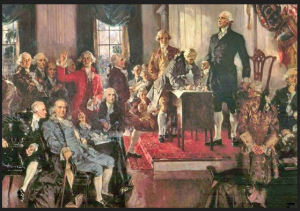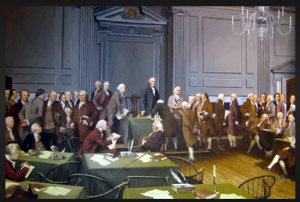Insure Domestic Tranquility
We the People of the United States, in Order to form a more perfect Union, establish Justice, insure domestic Tranquility, provide for the common defense, promote the general Welfare, and secure the Blessings of Liberty to ourselves and our Posterity, do ordain and establish this Constitution for the United States of America.
 The above paragraph is the Preamble to the U.S. Constitution. It was signed by 38 of 41 delegates at the Constitutional Convention in Philadelphia on September 17, 1787. Earlier that summer, on May 25, 1787, delegates from every state except Rhode Island convened at the building now known as Independence Hall. It had earlier seen the drafting of the Declaration of Independence and the signing of the Articles of Confederation. Revolutionary War hero and first president, George Washington, who was a delegate from Virginia, was the convention president.
The above paragraph is the Preamble to the U.S. Constitution. It was signed by 38 of 41 delegates at the Constitutional Convention in Philadelphia on September 17, 1787. Earlier that summer, on May 25, 1787, delegates from every state except Rhode Island convened at the building now known as Independence Hall. It had earlier seen the drafting of the Declaration of Independence and the signing of the Articles of Confederation. Revolutionary War hero and first president, George Washington, who was a delegate from Virginia, was the convention president.
Signing the Constitution

Article VII required that the Constitution would not be binding until it was ratified by nine of the 13 states. It was ratified by five states–Delaware, Pennsylvania, New Jersey, Georgia, and Connecticut very quickly at the end of the year. Many other states opposed the document because it did not reserve undelegated powers to the states and lacked basic political rights, such as freedom of speech, religion, and the press. A compromise was reached in February 1788, under which holdout states would agree to ratify the document with the assurance that amendments would be immediately proposed.

It was narrowly ratified in Massachusetts, then Maryland and South Carolina. On June 21, 1788, the ninth state, New Hampshire, ratified the document. It was agreed that government, under the new Constitution, would begin on March 4, 1789. Virginia and New York ratified the Constitution that summer.
Happy 230th birthday to the most enduring guarantor to “Insure Domestic Tranquility” every conceived in the minds of men.
